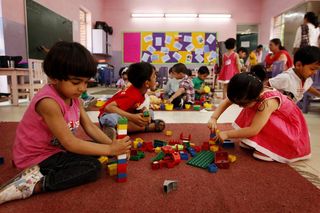
Under Pressure, Parents Go to Great Lengths for Preschool Admission
As education demand grows, and supply shrinks, “feeder schools” become even more unattainable.

Preschool admissions are tougher than getting into Ivy League colleges, says Mumbai-based M.P., who asked to be identified only by his initials. “For my son’s preschool admission last year, I queued up at 5 am to grab an admission form,” he says. “The seats are few, but forms are so many. Does a class that small require this level of competition?”
A.A. had to get preschool admission forms when her daughter was just 3 months old. (All parents who agreed to be interviewed for this article requested they be identified only by initials, out of concern their children would face repercussions at school.) “It is physically exhausting to run around when the baby is that small and tough to decide schools before understanding what will be best for her,” she adds.
Even as more and more Indian families have been able to afford better education for their children, the supply of preschools has changed little. This has made competition for acceptance into preschools — especially those seen as ‘feeders’ to good primary and high schools — fierce. And the demands on families are unrealistic, parents say.
Unrealistic demands
The problem doesn’t end with the forms. Even admission interviews are a harrowing experience, say parents. For instance, at a preschool admission for her daughter, A.S. was asked if she’d had a normal delivery, whether her daughter was breastfed or formula-fed, and why she decided not to continue with her work. “First, these are very personal and uncomfortable questions to answer in front of a panel of seven to 10 members that include men. Second, why I decided to quit is a personal matter between me and my husband. How should it matter to them?” she says.
Admission anxiety may be a well-known phenomenon, but with the rising level of competition, even among young kids, parents say they are willing to go to any lengths to ensure their child gets into the best preschool. For M.P., queuing up early in the morning, disturbing his daily routine and, on some days, even missing work was the least of his worries if it guaranteed a seat in a prestigious preschool.
But the lack of transparency in the education system has left him frustrated. “In the interviews for the schools I wished my son went to, I felt my son did well by interacting and answering everything that was asked, but [he] was rejected,” he says. “When we asked the schools what happened, we didn’t get a satisfactory reply. This not only demotivated us, but forced us to settle for a school we weren’t keen on, along with making our son feel dejected about the school he really wanted to attend.”
“It would’ve saved a lot of time and effort if schools told us where we went wrong,” he adds.
A.A., on the other hand, though tired about the running around, feels luckier compared to friends who had to apply while they were still pregnant. “It’s a lot to ask for from parents, whether while pregnant or when the baby is three months. I wish there was another way out to ease the admission process,” she says.
She says she experienced other admission roadblocks, too. One of the schools was particular about giving a seat only if one of the parents had been an alum; others decided admission based on the child’s locality and pin code; still others both parents to be working.
“These demands are unrealistic,” she says.
Related on The Swaddle:
Choosing a Preschool That’s Right for Your Child
Post-admission, pressure mounts
After the child has been admitted, parents say, the demands don’t stop. They report having to continue to live up to unreasonable school expectations in order to ensure that preschools grade their child highly and help them get a seat in well-regarded primary schools.
For instance, many preschools have compulsory parent-toddler programs that demand one parent attend school with their toddler thrice a week. “It’s thoughtful, but it puts us in a spot,” A.A. says. “As a homemaker, I can attend it. But what about both parents who are working? My husband has had to take the day off from work many times to attend these, and it has ended up affecting work.”
“We also see preschool as some time off from baby duties, but can’t even reject these because the school may label us as non-participating or not help with admissions for higher classes,” she adds.
Related on The Swaddle:
What You Didn’t Know to Look for in a Preschool (But Should)
The principal of a Mumbai-based preschool, who agreed to speak anonymously, says schools’ requirements of parents are there for a reason. “How do we meet the demand if certain rules are not in place?” she asks. In her school, although admission forms have to be bought at three months, she says, the forms clarify what’s needed and what’s not from the beginning. “After scanning profiles rigorously and a round of interviews, if we feel the parents should try elsewhere, we tell them along with letting them know what went wrong in the interview so they can prepare the child well for the next one,” she says. “What’s the point in wasting everyone’s time?”
However, not all schools offer the same amount of clarity, says V.K., a parent from Mumbai. “While some have limited number of seats, but sell hundreds of applications, some expect you to know someone from the same school to even have your form considered,” he says. “I spent sleepless nights stressing about whether my daughter will get into a school or not. I lost so much weight.”
At the end of the day, parents like Mumbai-based M.R. say families have no choice but to comply with the preschool rat race. “Since higher-grade school admissions depend on which preschool the child is coming from, it’s better to do some backward planning,” she says. “We enrolled our daughter accordingly.”
Is it worth it?
As the demands grow and the pressure on parents increases, parents are asking: is all this worth it?
It may not be.According to economists Stacy Dale and Alan Krueger, it is primarily the student, not the school, that is responsible for success. In a 2014 study, they compared students who attended prestigious universities to others who were accepted, but who chose to attend different, less prestigious schools. Twenty years later, the researchers found no difference in job advancement or income level between the two groups.
Author of various New York Times best-selling books on education and psychologist Madeline Levine, says on her blog, “No school ensures either success or failure. Ask yourself [as parents] are the rewards involved in acceptance to prestigious schools worth the risks? The stress of keeping up the grades, and the pace, necessary for acceptance in schools exacts a heavy price.”
Until more quality preschools open to catch up with the current demand, parents are left bending over backwards to get their children into preschool. While Sandeep Bal, of the education counselling firm Study Along, agrees that preschool admissions are made into a bigger deal than they actually are, unfortunately, he says, in order to get an admission, parents have to stick to the convoluted process.
At least, until the concept of what makes a school ‘best’ changes. What will really help ease the pressure, says Levine, is to recognize that,”prestigious schools are great for some kids, but they’re certainly not right for every kid. Whether a school is the right ‘fit’ may determine whether your child has a rewarding college experience or a miserable one. Prize your child’s happiness over the society’s notion of success.”
Anubhuti Matta is an associate editor with The Swaddle. When not at work, she's busy pursuing kathak, reading books on and by women in the Middle East or making dresses out of Indian prints.
Related


The Buzz Cut: Angelina Jolie Is Here to Save Us From Marvel Universe’s Misogyny
